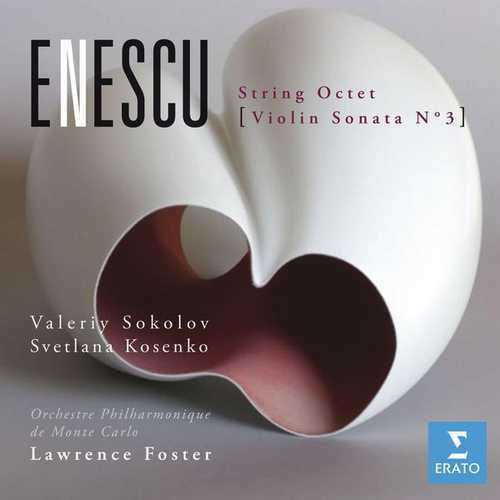
Composer: George Enescu
Performer: Valeriy Sokolov, Svetlana Kosenko
Orchestra: Orchestre Philharmonique de Monte-Carlo
Conductor: Lawrence Foster
Format: FLAC (tracks)
Label: Erato
Release: 2009
Size: 297 MB
Recovery: +3%
Scan: cover
Octet in C major Op. 7
01. I. Très modéré
02. II. Très fougueux
03. III. Lentement
04. IV. Mouvement de valse bien rythmé
Violin Sonata No. 3 in A minor, Op. 25 ‘dans le caractère populaire roumain’
05. Vivace con brio
06. Andantino cantabile
07. Allegro con spirito
Two contrasting string works by Romania’s greatest composer, himself a legendary violinist, are performed by the soloists of the Orchestre Philharmonique de Monte Carlo – conducted by Enescu expert Lawrence Foster – and young violinist Valeriy Sokolov, whose international breakthrough came with his victory at the 2005 George Enescu International Competition in Bucharest.
This new recording of string music by George Enescu, Romania’s greatest composer and a legendary violinist, brings together two works which contrast in both style and scale: the composer’s early string quartet in an orchestration by conductor Lawrence Foster, and his Violin Sonata No 3, performed by the young Ukrainian violinist Valeriy Sokolov (profiled by director Bruno Monsaingeon on the Virgin Classics DVD Un violon dans l’âme / Natural born Fiddler) and the pianist Svetlana Kosenko.
Enescu has a distinguished history on EMI: as a violinist in the classic recording of Bach concertos with his pupil Yehudi Menuhin, and with recordings of his music conducted by Lawrence Foster: the opera Oedipe, winner of France’s Grand Prix du Disque in 1991, and the symphonies Nos 1 to 3 coupled with the symphonic poem Vox Maris; Foster conducted the Orchestre Philharmonique de Monte Carlo on both these releases – he was the ensemble’s Principal Conductor from 1980 to 1990.
The Romanian composer (1881-1955) had a long connection with France, attending the Paris Conservatoire at the age of 14 and studying composition with Massenet and Fauré. The Octet was completed in 1900, when he was still just 18 years old, and Enescu judged it one of the first works to carry his personal stylistic and expressive stamp. Lawrence Foster, who first discovered the Romanian composer though his interest in the music of the composer’s friend Bartók, describes it as “a youthful, audacious piece, full of invention,” comparing its richly-layered late-Romanticism to Schoenberg’s in the more famous string work Verklärte Nacht (1899). Enescu’s octet is a large-scale piece, comprising four linked movements which last a total of some 40 minutes. Lawrence Foster cites a precedent in the composer’s letters for the idea of arranging the piece for string orchestra. At certain points in the score the conductor has made the choice of using a group of eight soloists rather than the full complement of players – not, he hastens to add, for technical reasons (though the music is often virtuosic), but to capture the special mood of the music at those moments.
In September 2005 Valeriy Sokolov, born in 1986, won the Grand Prix at the George Enescu International Competition in Bucharest, as well as the award for Best Performance of Enescu’s Sonata No. 3, and the Enescu Foundation Prize. He has recently struck up a duo partnership with fellow Virgin Classics artist David Fray. Written in 1926 and subtitled ‘Dans le caractère populaire roumain’, the Sonata No 3 evokes the rhapsodic, highly ornamented spirit of Romanian folk music, although it does not quote any traditional melodies directly.
It was Sokolov’s performance of this sonata that inspired Bruno Monsaingeon to make the violinist the subject of a documentary. He said: “… Not the slightest tension marred the impression he gave of being totally at ease with his instrument,” and praised Sokolov’s “absolute control of technique, his musical maturity, and above all an utter abandonment to the flow of the music.”
“… Not the slightest tension marred the impression he gave of being totally at ease with his instrument,” and praised Sokolov’s “absolute control of technique, his musical maturity, and above all an utter abandonment to the flow of the music.” Bruno Monsaingeon